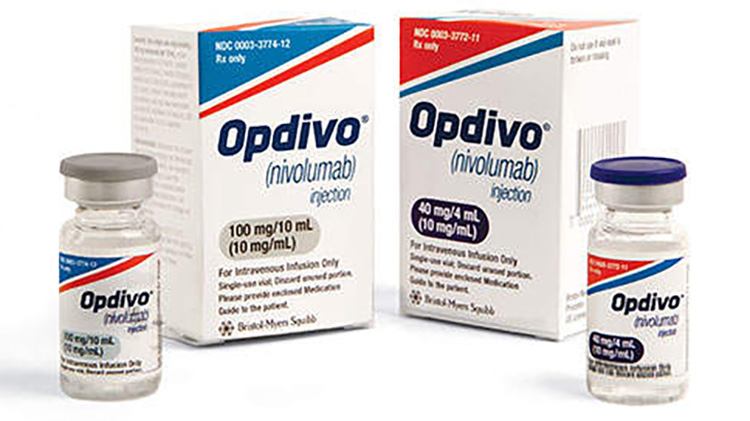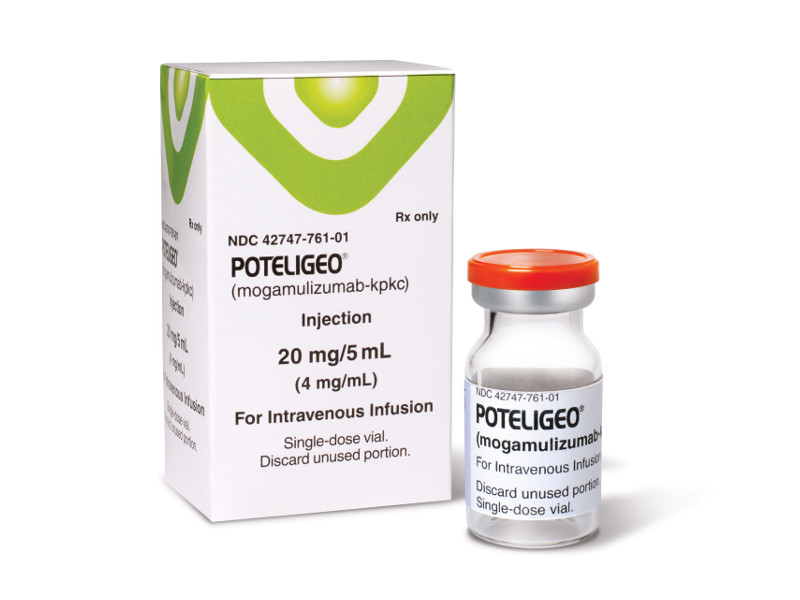Opdivo (Nivolumab) vs Poteligeo (mogamulizumab)
Opdivo (Nivolumab) vs Poteligeo (mogamulizumab)
Opdivo (nivolumab) is a PD-1 blocking antibody designed to harness the body's immune system to help restore anti-tumor immune response, and it is indicated for a variety of cancers including melanoma, lung cancer, and kidney cancer. Poteligeo (mogamulizumab) is a monoclonal antibody that targets the CCR4 receptor and is used primarily for the treatment of certain types of cutaneous T-cell lymphoma (CTCL), such as mycosis fungoides and Sézary syndrome. When deciding between Opdivo and Poteligeo, it is crucial to consider the specific type of cancer being treated, as each medication is approved for different indications and works through different mechanisms of action within the immune system.
Difference between Opdivo and Poteligeo
| Metric | Opdivo (Nivolumab) | Poteligeo (mogamulizumab) |
|---|---|---|
| Generic name | Nivolumab | Mogamulizumab |
| Indications | Various types of cancers including melanoma, lung cancer, renal cell carcinoma, Hodgkin lymphoma, head and neck cancer, urothelial carcinoma, and more. | Treatment of adult patients with relapsed or refractory mycosis fungoides or Sézary syndrome after at least one prior systemic therapy. |
| Mechanism of action | Programmed death receptor-1 (PD-1) blocking antibody, which inhibits the PD-1/PD-L1 pathway, enhancing T-cell response and cell-mediated immune responses against tumor cells. | Monoclonal antibody targeting CC chemokine receptor 4 (CCR4), leading to the depletion of CCR4-expressing cells. |
| Brand names | Opdivo | Poteligeo |
| Administrative route | Intravenous infusion | Intravenous infusion |
| Side effects | Fatigue, rash, musculoskeletal pain, pruritus, diarrhea, nausea, weakness, upper respiratory tract infection, cough, difficulty breathing, and decreased appetite. | Infusion reactions, skin rash, fatigue, diarrhea, musculoskeletal pain, and upper respiratory tract infection. |
| Contraindications | None known beyond hypersensitivity to nivolumab or its excipients. | None known beyond hypersensitivity to mogamulizumab or its excipients. |
| Drug class | Immune checkpoint inhibitor | Monoclonal antibody |
| Manufacturer | Bristol Myers Squibb | Kyowa Kirin |
Efficacy
Efficacy of Opdivo (Nivolumab) in Treating Lymphoma
Opdivo (Nivolumab) is a PD-1 (programmed death-1) inhibitor that has shown efficacy in treating certain types of lymphoma, particularly Hodgkin lymphoma (HL). Clinical trials have demonstrated that Nivolumab can induce a response in a significant proportion of patients with relapsed or refractory classical Hodgkin lymphoma. The drug works by blocking the PD-1 pathway, which some cancer cells use to hide from the immune system. By inhibiting PD-1, Nivolumab helps the immune system to recognize and attack cancer cells. The response rates in clinical trials for patients with relapsed or refractory HL after autologous stem cell transplant (ASCT) who were treated with Nivolumab have been promising, with many patients achieving partial or complete remission.
Efficacy of Opdivo (Nivolumab) in Other Lymphomas
While Opdivo has been most extensively studied and used in Hodgkin lymphoma, its efficacy in non-Hodgkin lymphoma (NHL) is also being explored. Certain subtypes of NHL, such as primary mediastinal large B-cell lymphoma (PMBCL) and follicular lymphoma, have been subjects of clinical trials. The results have been mixed, with some patients responding well to the treatment and others showing less benefit. The efficacy of Nivolumab in these types of lymphoma continues to be evaluated, and its use may expand as more data becomes available.
Efficacy of Poteligeo (Mogamulizumab) in Treating Lymphoma
Poteligeo (Mogamulizumab) is a monoclonal antibody that targets CC chemokine receptor 4 (CCR4) and has been approved for the treatment of certain types of cutaneous T-cell lymphoma (CTCL), including mycosis fungoides (MF) and Sézary syndrome (SS). Mogamulizumab has been shown to be effective in patients with relapsed or refractory CTCL. In clinical trials, the drug has led to improved progression-free survival rates compared to previous standard treatments. Its mechanism of action involves binding to CCR4 on the surface of cancerous T-cells, which are then targeted and destroyed by the immune system.
Comparative Efficacy and Considerations
When comparing Opdivo and Poteligeo, it is important to note that they are used to treat different types of lymphoma and work through different mechanisms of action. Opdivo has shown significant efficacy in Hodgkin lymphoma and is being investigated for various non-Hodgkin lymphomas. Poteligeo, on the other hand, is specifically indicated for certain types of cutaneous T-cell lymphoma. Both drugs represent advances in the immunotherapy treatment landscape for lymphoma, offering options for patients who have relapsed or refractory disease. However, the choice of treatment depends on the specific type of lymphoma, the patient's overall health, and previous treatments received.
Regulatory Agency Approvals
Opdivo
-
European Medical Agency (EMA), European Union

-
Food and Drug Administration (FDA), USA

-
Health Canada

-
Pharmaceuticals and Medical Devices Agency (PMDA), Japan

-
Therapeutic Goods Administration (TGA), Australia

-
Medsafe (NZ)

Poteligeo
-
European Medical Agency (EMA), European Union

-
Food and Drug Administration (FDA), USA

-
Therapeutic Goods Administration (TGA), Australia

Access Opdivo or Poteligeo today
If Opdivo or Poteligeo are not approved or available in your country (e.g. due to supply issues), you can access them via Everyone.org.
How it works

Make an enquiry
Choose the medicine you want to buy, answer a couple of questions, and upload your prescription to speed things up. We’ll get back to you within 24 hours.


Make an enquiry
Choose the medicine you want to buy, answer a couple of questions, and upload your prescription to speed things up. We’ll get back to you within 24 hours.


Breeze through the paperwork
We'll guide you through the required documents for importing unapproved medicine, ensuring you have all the necessary information.


Get a personalized quote
We’ll prepare a quote for you, including medicine costs and any shipping, administrative, or import fees that may apply.


Receive your medicine
Accept the quote and we’ll handle the rest - sourcing and safely delivering your medicine.

Some text on this page has been automatically generated. Speak to your physician before you start a new treatment or medication.
Let's talk
If you have any questions, call us or send us a message through WhatsApp or email:
Contact us




